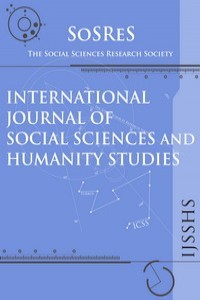A COSMOPOLITAN APPROACH TO THE EUROPEAN CRISIS
A COSMOPOLITAN APPROACH TO THE EUROPEAN CRISIS
The paper analyses the political implications of the European crisis from a cosmopolitan perspective. A qualitative approach grounded on cosmopolitanism and cosmopolitan democracy seeks the ways with which the EU could overcome the crisis enhancing its limited a) internal and b) external cosmopolitanism. In the first case the analysis focuses on how the EU could shift away from intergovernmentalism towards cosmopolitanism with new institutional instruments of solidarity, unity and cooperation. In the second case, the argument is that a successful enlargement strategy, especially towards Turkey, can contribute to the cosmopolitanisation of Europe. Overall, the conclusions drawn from the attempt to apply cosmopolitanism to the EU suggest that, indeed, cosmopolitanism, which transforms political and cultural subjectivities in the encounter of the local/national with the global, can potentially be practically feasible, showing that globalisation and European integration can be conceived as processes that may strengthen each other.
Keywords:
cosmopolitanism, EU crisis enlargement,
___
- Agne, Hans (2011), “Cosmopolitan Democracy and Legitimate Founding of Political Community: Why Turkey has a Right to Participate in the Politics of EU enlargement” (in: Daniele Archibugi and Guido Montani -Eds, The Ventotene papers), Italy: The Altiero Spinelli Institute for Federalist Studies, pp.7-19.
- Archibugι, Daniele, Held, David and Kohler, Martin (eds) (1998), Re-imagining Political Community, Cambridge: Polity Press.
- Archibugi, Daniele and Held David (eds) (1995), Cosmopolitan Democracy: An Agenda for a New World Order, Cambridge: Polity Press.
- Baban, Feyzi and Keyman, Fuat (2006), “Turkey and the postnational Europe: challenges for the emerging political community” Paper Presented at the Annual Meeting of the International Studies Association. San Diego.
- Beck, Ulrich and Grande, Edgar (2007), Cosmopolitan Europe, Cambridge: Polity Press. Delanty, Gerard and He, Baogang (2008), “Cosmopolitan Perspectives on European and Asian Transnationalism”, International Sociology, vol. 23, no. 3, pp. 323-344.
- Delanty, Gerard and Rumford, Chris (2005), Rethinking Europe: Social Theory and the Implications of Europeanisation, London: Routledge.
- Delanty, Gerard (2003), “The Making of a Post-Western Europe: A Civilisational Analysis”, Thesis Eleven, vol. 72, pp. 8-24.
- Eriksen, Erik (2009), The Unfinished Democratisation of Europe, Oxford: Oxford University Press.
- Habermas, Jurgen (2003), “Toward a Cosmopolitan Europe”, Journal of Democracy, vol. 14, no. 4, pp. 86-100.
- Habermas, Jurgen (2001), The Postnational Constellation; Political Essays, Cambridge: Polity Press.
- Held, David (1995), Democracy and the Global Order: From the Modern State to Cosmopolitan Governance, Cambridge: Polity Press.
- Herrmann, Richard, Risse, Thomas and Brewer, Marilynn (eds) (2004), Transnational Identities: Becoming European in the EU, New York: Rowman and Littlefield.
- Hoffe, Otfried (2007), Democracy in the Age of Globalisation, Germany: Springel.
- McGrew, Anthony (1997), The transformation of democracy?, Londres: Polity Press. Mignolo, Walter (2000), “The Many Faces of Cosmo-polis: Border Thinking and Critical Cosmopolitanism”, Public Culture, vol. 12, no. 3, pp. 721-48.
- Muftuler-Bac, Meltem (2011), “The European Union and Turkey: Democracy, Multiculturalism and European Identity” RECON Online Working Paper. Oslo: ARENA-Centre for European Studies.
- Parker, Owen (2009), “Cosmopolitan Europe and the EU-Turkey Question: the Politics of a common destiny”, Journal of European Public Policy, vol. 16, no. 7, pp. 1086-1101.
- Rumford, Chris (ed.) (2006), Cosmpolitanism and Europe, Liverpool: Liverpool University Press.
- Zurn, Michael (2000), “Democratic Governance Beyond the Nation-State: the EU and Other International Institutions”, European Journal of International Relations, vol.6, no. 2, pp. 183-222.
- Başlangıç: 2009
- Yayıncı: Sosyal Bilimler Araştırmaları Derneği
Sayıdaki Diğer Makaleler
DIAGNOSTICS OF RUSSIAN CONSUMER MARKET STATE IN TERMS OF DESTRUCTIVE EFFECTS INFLUENCE
Siti Aisyah Binti PANATİK, Nurul Farhana Bt Mohd NOORDİN, Roziana SHAARİ, Siti Khadijah Zainal BADRİ
STOCKHOLDING AND FINANCIAL LITERACY IN THE FRENCH POPULATION
Luc ARRONDEL, Majdi DEBBİCH, Frédérique SAVİGNAC
MODEL OF HYPOTHECATED TAX ON INFORMATION GOODS
DETERMINATION OF THE FIRM-LEVEL WAGE RATE: THE ROLE OF EMPLOYER-EMPLOYEE SPECIFIC EFFECTS
THE IMPACTS OF SELF-BRAND CONGRUENCE ON BRAND LOYALTY: A STUDY ON CELLULAR PHONE USERS
